If you’re considering settling down or investing in Asia, Japan’s housing market is worth exploring. With a wide selection of flats for sale in Japan, strong property rights for foreigners, and a well-developed infrastructure, the country offers a compelling mix of tradition and modern living. Whether you’re eyeing a Tokyo apartment for sale or a countryside house in Kyoto, this guide will walk you through the essentials of buying an apartment in Japan, especially if you’re a non-Japanese resident.
Why More Foreigners Are Investing in Japanese Real Estate
Japan continues to stand out as one of Asia’s most stable and welcoming destinations for real estate investment. In contrast to many countries that impose restrictions on foreign ownership, Japan allows non-citizens to purchase both land and residential properties outright, without the need for permanent residency or special permits.
This open approach, combined with the country’s resilient economy, world-class public transportation, and remarkably safe cities, makes Japan an increasingly attractive option not only for property investors, but also for individuals and families looking to establish a long-term home in a well-organized and culturally rich society.
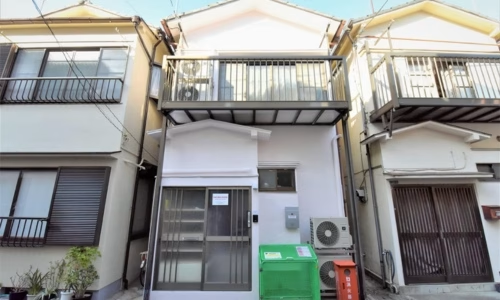
Which Kinds of Homes Can You Find in Japan?
As you explore the housing market in Japan, you’ll come across a wide range of residential options to match different preferences and lifestyles. From modern apartments in Tokyo such as compact 1LDK or more spacious 2LDK layouts to standalone homes in quieter suburban neighborhoods, the choices are diverse. You’ll also find traditional Japanese houses (kominka) featuring tatami flooring and wooden beams, as well as brand-new condominium complexes in urban centers that offer contemporary design and premium shared facilities.
Each property type caters to a specific need. Families, for instance, tend to gravitate toward the suburbs where larger homes offer more space and better value. Meanwhile, professionals and younger residents often prefer the convenience of Tokyo flats for sale located in lively areas like Shibuya, Meguro or Shinagawa, close to offices, shops and public transit.
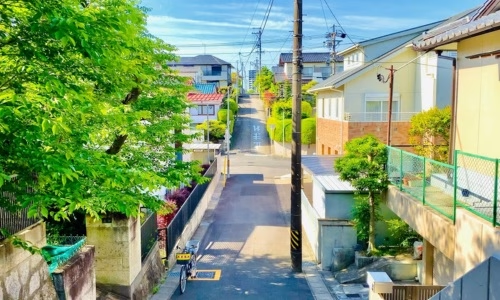
Popular Cities to Consider for Property Purchase
If you’re considering buying an apartment in Japan, several cities stand out for their unique appeal and long-term value.
Tokyo
As the capital and largest metropolitan area in the country, Tokyo provides an exceptional variety of properties, ranging from compact studios to luxury penthouses in central districts. Although real estate in the city can be expensive, buying apartment in Tokyo means gaining access to world-class infrastructure, international schools, and a vast public transit network. Many foreign buyers are particularly drawn to flats in Tokyo for sale in neighborhoods like Shinjuku, Meguro, and Minato, where convenience and quality of life go hand in hand.
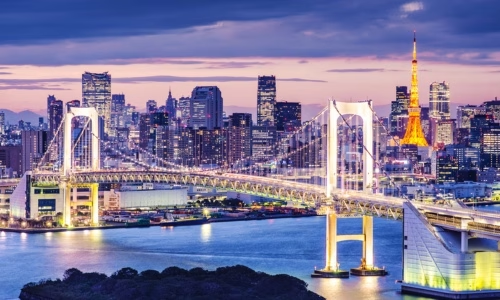
Osaka
Osaka combines commercial energy with cultural vibrancy, making it a top choice for investors and home buyers alike. Property prices here are typically more affordable than in Tokyo, while rental demand remains strong. This balance between cost and opportunity makes Osaka ideal for those seeking stable returns. In recent years, the city has also seen a rise in professionals relocating due to attractive Japan jobs salary packages and a more relaxed pace of life.
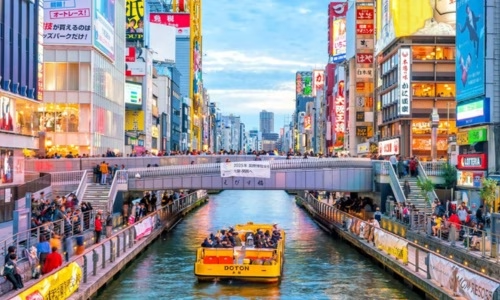
Fukuoka and Sapporo
These regional hubs are gaining popularity thanks to their livability and affordability. Fukuoka boasts a growing tech scene, excellent connectivity, and a high quality of life. Sapporo offers beautiful natural surroundings and spacious modern apartments at reasonable prices. Both cities present an excellent entry point into the Japanese housing market, especially for buyers who want to stretch their budget. Compared to major urban centers, the Japan average income in these regions can go further when it comes to homeownership.
Whether you’re purchasing a home to live in or looking for an investment property, these cities provide compelling options within Japan’s stable and transparent real estate system.
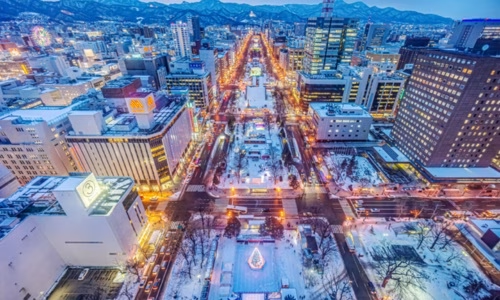
How Much Does It Cost to Buy an Apartment in Japan?
Japan property prices can differ greatly based on the city, neighborhood, and type of building you’re interested in. Urban centers like Tokyo naturally come with a higher price tag, while rural regions tend to be much more affordable. Below is a general overview to give you an idea of what to expect when searching for flats for sale in Japan or evaluating a potential Tokyo apartment for sale:
Location | Average Price (USD) per m² |
Central Tokyo | $8,000 – $15,000 |
Suburban Tokyo | $3,500 – $6,000 |
Osaka | $2,500 – $5,000 |
Rural towns | $500 – $2,000 |
While Tokyo commands the highest prices, especially in areas like Minato, Shibuya, and Chiyoda, buyers can still find good value in outer wards or nearby cities. Osaka offers a balanced market with solid rental potential, while rural towns provide larger properties for a fraction of the cost, ideal for those seeking a second home or countryside retreat.
Japan Average Salary in USD: Can You Afford to Buy?
Before deciding to buy, it helps to understand Japan’s income levels. In 2025:
- Japan average salary in USD: Estimated to fall between approximately $33,000 and $39,000 per year, this figure reflects the national average across all industries and employment types, including full-time and part-time workers.
- Japan average yearly income: Currently around ¥5.2 million per year, which is roughly $35,000 USD, this number gives a clearer picture of what a full-time employee in Japan might earn annually before taxes.
- Japan jobs salary: Can vary widely depending on factors such as location, sector, seniority, and education level. For example, positions in hospitality and retail tend to offer lower wages, while corporate or technical roles offer significantly more.
Urban professionals, especially those working in technology, finance, or international business, often earn well above the national average. Many employees in major cities like Tokyo or Osaka report annual salaries ranging from ¥7 million to ¥10 million, making property ownership more accessible for this demographic.
Can Non-Japanese Residents Qualify for a Mortgage?
Yes, foreigners can apply for housing loans in Japan, but there are several important conditions to keep in mind. Many Japanese banks and financial institutions are open to lending to non-citizens, especially if certain requirements are met:
- Holding the appropriate residency status: Applicants who have permanent residency or long-term visas such as a work visa, spousal visa, or highly skilled professional visa are more likely to be approved.
- Having a stable and verifiable source of income: This could be local income earned in Japan, or in some cases, overseas income, especially if it’s well-documented through pay slips, tax records, or bank statements.
- Providing a guarantor or sufficient down payment: In some cases, financial institutions may request either a Japanese co-signer or a down payment ranging from 10% to 30%, tailored to the borrower’s income and loan details.
- Enjoying favorable loan conditions: Interest rates in Japan remain low by global standards, usually around 1% to 2% annually, with repayment periods of up to 35 years, making long-term financing more accessible than in many other countries.
Thanks to these flexible conditions and low interest rates, buying apartment in Japan with financing is now more attainable for foreign residents and international investors than ever before.
What Legal Procedures Are Involved in a Property Purchase?
The steps involved when foreigners buy property in Japan are generally clear and manageable. While the legal framework is supportive, working with professionals will help ensure a smooth transaction. Here are the usual stages involved in the process:
- Search for a suitable property and agree on the sale price: Once you’ve identified a home or apartment that fits your needs and budget, you’ll begin negotiating the terms with the seller, often through a real estate agent.
- Sign a preliminary contract and make a deposit: This stage involves formalizing the agreement by signing a purchase contract. A deposit, typically between 5% and 10% of the total price, is paid at this point to secure the property.
- Carry out thorough due diligence: This includes verifying the legal ownership of the property, checking for any unpaid taxes or liens, and assessing the condition of the structure and surrounding land.
- Complete the final payment and register ownership: After confirming all legal and financial details, the remaining balance is transferred, and the ownership is officially recorded with the Legal Affairs Bureau.
- Settle required taxes and fees: Buyers are responsible for paying taxes such as acquisition tax, registration fees, and fixed-asset tax, which are calculated based on the assessed value of the property.
It’s highly advisable to work with a bilingual real estate agent and, if possible, a legal adviser familiar with Tokyo real estate or the area you’re buying in. This is especially important in fast-moving markets, where contracts, inspections, and financial paperwork can become complex.
Important Details to Verify Before You Buy
Whether you’re buying an apartment in Tokyo or purchasing a home in another part of Japan, there are several key factors to consider before finalizing your decision:
- Age of the building: Older properties, especially those built before modern construction standards were adopted, may come with a lower price tag, but they can also have reduced resale value, higher repair costs, and less energy efficiency.
- Land rights and ownership structure: When purchasing a condominium, be aware that you may not own the land beneath the building. In many cases, only the interior space is yours, while the land is held jointly or by a management association.
- Ongoing maintenance and management fees: Monthly condo maintenance fees cover shared services such as cleaning, elevator upkeep, and building repairs. These costs vary but should be factored into your long-term housing budget.
- Earthquake resistance and safety standards: Japan is prone to seismic activity, so it’s essential to confirm that the building complies with the latest earthquake-resistant construction codes. Newer properties built after 1981 typically meet updated safety regulations.
Taking these aspects into account will help you make a more informed and secure investment in the Japan housing market, whether you’re planning to live in the property or hold it as an asset.
What to Do Once You’ve Bought Your Property
After completing your purchase, there are several important tasks to take care of to ensure a smooth transition into property ownership in Japan:
- Register the property with the Legal Affairs Bureau: This is a required legal step to officially record your ownership. The process includes submitting documents like the deed of sale, proof of payment, and identification. Timely property registration in Japan ensures your legal rights are protected.
- Set up essential utilities and insurance: You’ll need to activate water, electricity, gas, and internet services in your name. It’s also advisable to obtain property insurance to cover fire, natural disasters, or potential damage.
- Learn the rules of your local community: Particularly in condominiums, there may be guidelines on noise levels, waste separation, shared facility usage, and guest access. Understanding these community rules helps avoid conflicts with neighbors and the building management.
- Pay annual taxes on the property: As a homeowner, you’ll be responsible for property taxes, including the fixed asset tax and city planning tax, which are based on the value of your land and building.
- Consider hiring a property management company: If your purchase is intended as a rental or vacation property, a reliable property management firm can assist with tenant screening, rent collection, maintenance, and local compliance, saving you time and stress, especially if you live overseas.
Arealty – Your Trusted Partner for Renting and Buying Homes in Japan as a Foreigner
Finding a place to live in Japan can be overwhelming, especially for foreigners unfamiliar with the language and local procedures. Arealty was created to make the process of renting or buying property in Japan simpler, safer, and more accessible for international clients.
Why Choose Arealty?
- Multilingual support and full-service guidance: Arealty’s team speaks English, Vietnamese, and other languages, providing step-by-step assistance throughout the entire rental or purchase process.
- Expertise in working with foreigners: With extensive experience helping non-Japanese clients, Arealty understands your specific concerns and lifestyle needs when relocating or investing in Japan.
- Wide selection of verified listings: From city-center apartments in Tokyo to spacious houses in the suburbs, Arealty offers a broad range of housing options with accurate descriptions, real photos, and transparent pricing.
- Smooth legal and paperwork handling: You won’t have to navigate Japan’s complex real estate procedures alone. Arealty takes care of the documents and ensures everything is processed correctly and efficiently.
- Reliable post-move support: Even after you’ve moved in, Arealty remains available to help with lease-related matters, maintenance coordination, and future housing needs.
With a reputation built on integrity and service, Arealty makes it easier for foreigners to secure a comfortable, legal, and hassle-free home in Japan.
Contact Information
- Address: Apartment 605, Tohto Building, 1-5-4 Hyakunincho, Shinjuku-ku, Tokyo 169-0073, Japan
- Hotline: 050 6864 9697
- Email: info@arealty.jp
- Website: https://arealty.jp/#/home
Conclusion
With the yen at a historic low and interest rates remaining favorable, this is an ideal time to consider investing in Japanese real estate. Whether you’re moving for work, looking for a second home, or expanding your portfolio, buying an apartment in Japan, especially in cities like Tokyo or Osaka, offers a rare mix of stability, long-term growth, and overall value

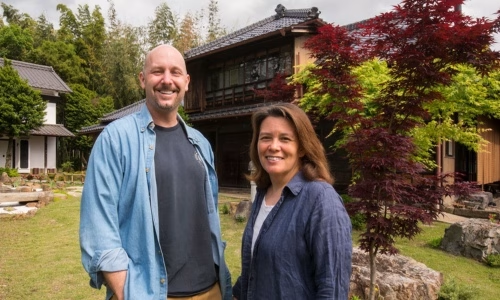



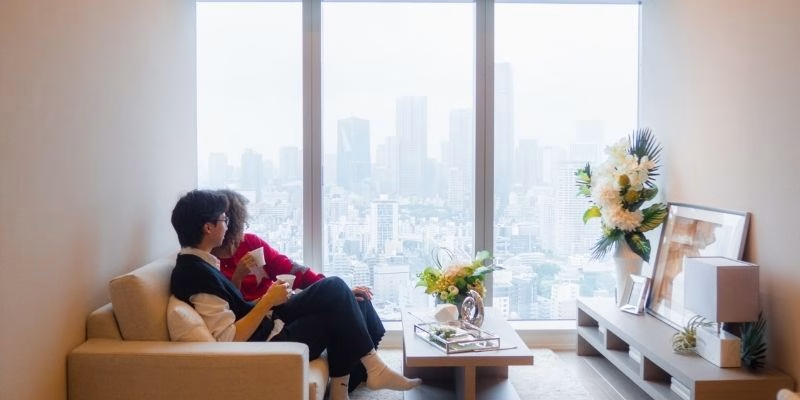
Leave a Reply